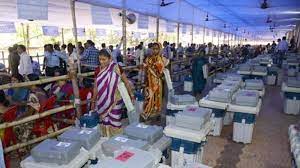One Nation One Election : Committee Proposed Changes

The High-Level Committee on One Nation, One Election, led by former President Ram Nath Kovind, has proposed significant changes to enable synchronized elections across India.
- One Nation One Election is a proposal to synchronize the timing of all elections in India, including those for the Lok Sabha, state legislative assemblies, and local bodies.
- The aim is to streamline the electoral process, reduce campaign expenditures, minimize disruptions to governance, and enhance political stability by holding all elections simultaneously at regular intervals, typically once every five years.
- One Nation One Election was the norm until 1967 but after that cycle was broken.
- Earlier Law Commission also recommended the idea of ONOE in its report.
Key Recommendations of the High-Level Committee:
- Synchronize Lok Sabha and State Legislative Assemblies (SLA) elections first, followed by Municipalities and Panchayats elections (M&PE).
- Amendments in Article 324A are required for this synchronization, but states’ ratification is not necessary.
- The amendments needed for simultaneous elections are outside the scope of Article 368(2) and thus don’t require ratification by the states.
- Municipal and Panchayat elections should be held within 100 days of Lok Sabha and State elections.
- For Lok Sabha, fresh elections should be held with tenure limited to the unexpired term of the previous Lok Sabha.
- For States, fresh elections should be held, continuing until the end of the full term of Lok Sabha.
- Amendments in Article 83 and Article 172 are needed, but state ratification is not required.
- An amendment to Article 325 is recommended, which will require states’ ratification.
- A Presidential notification would set an “appointed date” for simultaneous elections.
- The Constitution mainly entrusts Parliament, not states, with the power to conduct Assembly elections.
- Under Article 328 of the Constitution States have only residual powers on conducting Assembly elections; the power is mainly entrusted to Parliament through Article 327.




